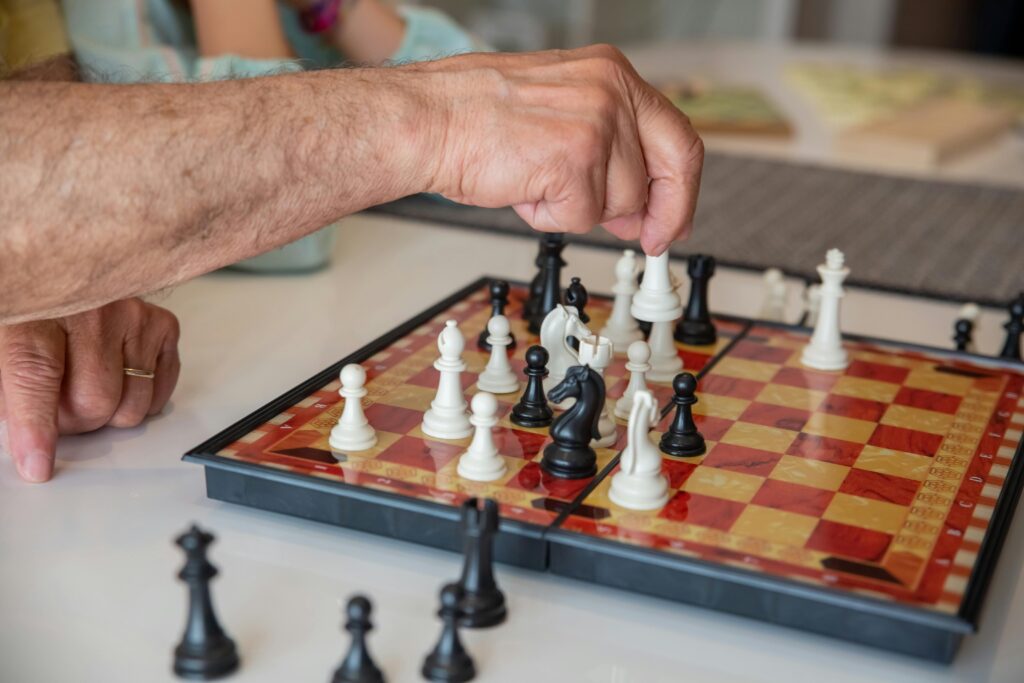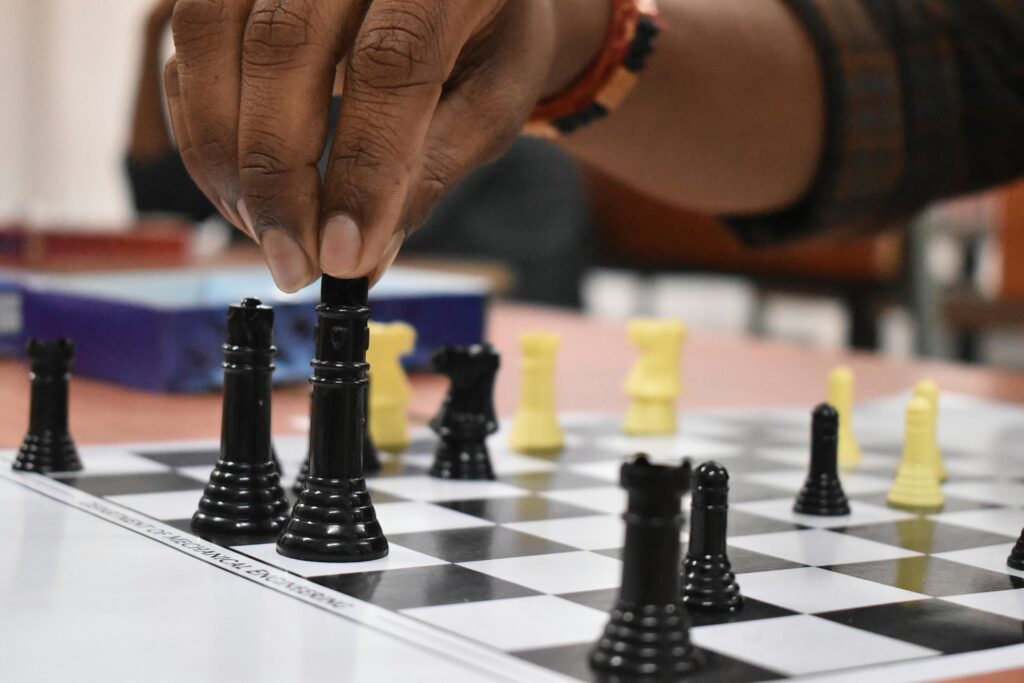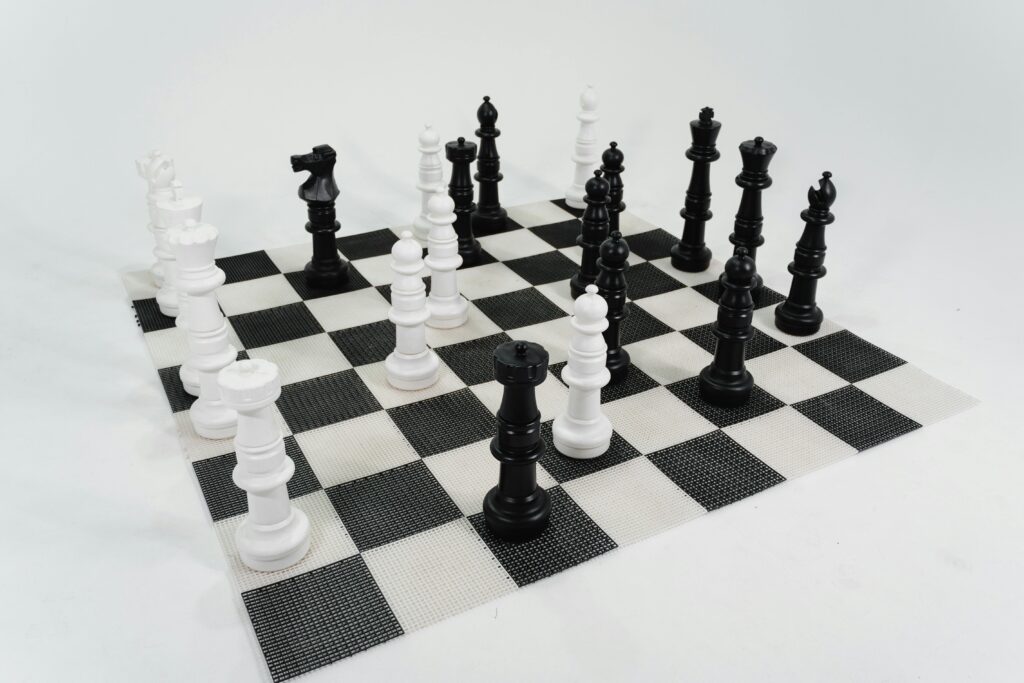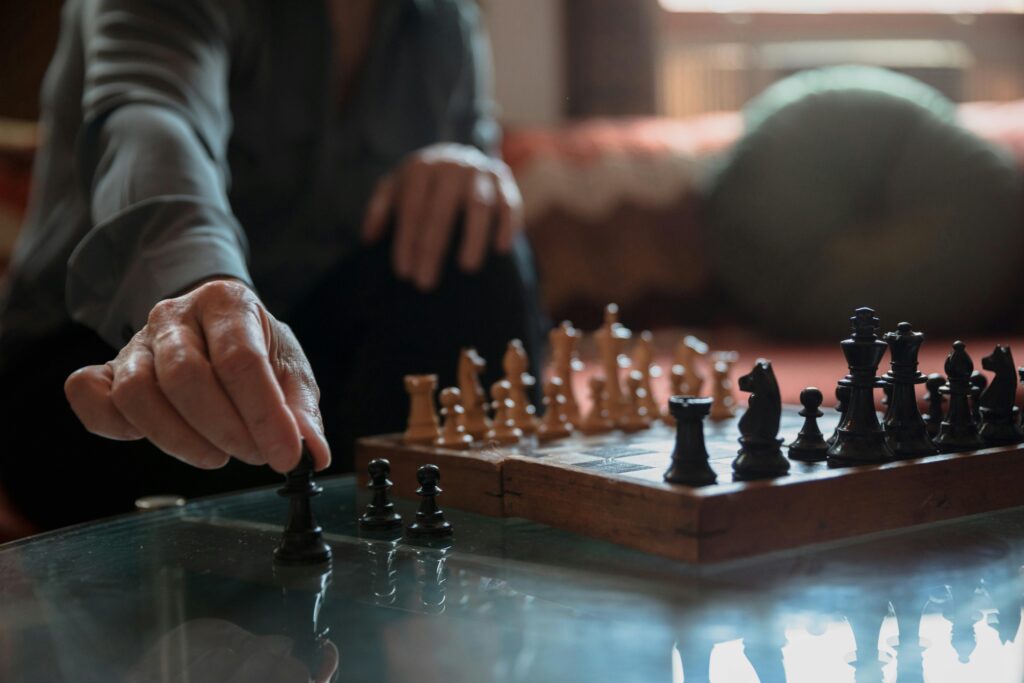Choosing the right chess academy can make a big difference—not just in how well your child plays the game, but also in how they think, solve problems, and grow in confidence. Chess is more than just a game. It’s a life skill. It teaches focus, patience, and how to stay calm under pressure. And the earlier a child starts learning it the right way, the better.
Online Chess Training
Landscape of Chess Training in Oldham and Why Online Chess Training is the Right Choice
Oldham is a beautiful place with a rich community. But when it comes to finding high-quality chess coaching, the options can feel limited—especially if you’re looking for a structured learning path that fits easily into your family’s routine.
Many local chess classes in Oldham are either after-school clubs or informal weekend gatherings. These can be fun for kids who are just starting. But here’s the problem—most of these sessions are unstructured.
There’s no set path or plan. Kids play games, maybe learn a few tricks, and that’s about it. For a child who wants to grow, compete, and really think through the game, that’s just not enough.
Now here’s where online chess training changes everything.
Online chess learning brings the best teachers to your home. No driving through traffic. No waiting in halls. Just your child, a good internet connection, and world-class chess coaches guiding them step by step. Every lesson has a purpose.
Every class builds on the last one. And best of all? It’s flexible and designed around your child’s speed and style of learning.
Parents in Oldham are starting to see how powerful this is. More and more families are switching to online classes not just for convenience—but for better results.
Your child gets to learn from FIDE-certified coaches, take part in real online tournaments, and follow a plan made just for them. They build focus. They learn how to solve problems smartly. And they grow confident—not just in chess, but in life.
That’s the power of online training done right.
Let’s now talk about the best in the business—Global School of Chess.
How Global School of Chess is The Best Choice When It Comes to Chess Training in Oldham
At Global School of Chess, we believe chess is more than a game—it’s a journey. And every child’s journey is special.
Here’s what makes us stand out:
We don’t teach one-size-fits-all classes. We create custom paths for every child, based on where they are right now and where they want to go. Whether your child is a total beginner or already playing tournaments, we know how to take them to the next level.
All our classes are live and fully interactive. Kids don’t just sit and watch—they play, they ask questions, they learn together. Our coaches are not just experts in chess; they’re experts in teaching kids in a way that’s fun, simple, and truly engaging.
We have FIDE-certified coaches who’ve taught students across the world. Our students come from nine different countries. And we’re proud of how they’ve grown—not just in chess ratings, but in confidence, focus, and smart thinking.
Here’s how our online program works:
We start with a free trial class. That’s where we understand your child’s level and style. Then we place them in the right group or set them up with private coaching. Every week, they attend classes, join practice sessions, and even compete in friendly online tournaments with kids from around the world.
We also give you regular updates, feedback, and support so you always know how your child is doing.
No more guessing. No more wondering if they’re really learning.
With Global School of Chess, your child gets a full journey—from learning the rules to mastering strategy, from shy beginner to bold competitor.
And it all starts from the comfort of your home.
Want to see how your child likes it? Sign up for a free trial class now.
It’s risk-free, fun, and a great way to explore the world of chess together.
Offline Chess Training
In Oldham, like many towns, most offline chess training happens in community centers, school clubs, or local chess associations. These places are often led by passionate chess lovers—sometimes former players or volunteers. The sessions usually run once a week or a few times a month.
Now, these local groups are a great starting point for someone who just wants to dip their toes in. Kids get to meet others, play casual games, and maybe even hear a few strategies from an older player or two. There’s a sense of community, and that’s always a good thing.
But as your child grows in interest—or shows signs of real talent—you might start to feel something is missing.
Here’s why.
Most offline programs don’t follow a structured curriculum. There’s no plan that says, “This week we’ll learn endgames,” or “Next week we’ll cover openings.” Many kids end up playing the same type of games, learning random tricks, and never really mastering the basics or building real strategy.
And what about feedback? In group sessions, it’s rare. Coaches have too many kids to watch closely. So your child might keep making the same mistakes again and again without knowing it.
Also, timing can be tough. Offline classes happen at set times, which means if you miss one, you fall behind. There’s no replay. No way to review. No way to ask a question the next day if you get stuck.
That’s why more and more families in Oldham are starting to feel that offline chess, while charming, just can’t match the power and flexibility of online learning—especially when it’s done the right way.
Drawbacks of Offline Chess Training
Let’s talk clearly about what holds back offline chess coaching.
No structure. Imagine trying to learn math without knowing if you’ll study addition, subtraction, or fractions each week. That’s what it’s like in most offline chess setups. There’s no roadmap. No steady progress. Kids float through random lessons.

Limited feedback. Offline coaches can’t give each child personal time every week. They’re juggling a room full of students. Your child might get a minute or two of advice, and that’s it.
Inconsistent quality. Some offline teachers are amazing. Others are just good players who don’t know how to teach. And sometimes, you don’t really know what kind of coach your child is getting.
Time and travel. Getting to class takes time. Bad weather, school events, or family plans? You miss a session. And that session might’ve been the one your child needed most.
No long-term plan. Most offline setups don’t offer tournaments, practice matches, or reviews of your child’s progress. They teach a bit, play a bit, and leave the rest to luck.
Now, think of what happens when you choose a place like Global School of Chess. There’s a clear plan. There are world-class teachers. Every class builds on the last one. And your child is supported every step of the way.
That’s the difference.
Offline chess has its charm. But for real growth, real learning, and real results, online is where the future lies.
And in the online world, one academy leads the way.
Let’s explore the top five chess academies in Oldham—and see how Global School of Chess stands tall above them all.
Best Chess Academies in Oldham, Manchester
Let’s look at five coaching choices you can find in and around Oldham. We’ll start with the one that truly leads the way, then look at others you might hear about. You’ll see why Global School of Chess stands out so clearly.
Global School of Chess
Why it leads the way
Global School of Chess is built for real results. We teach with a clear plan. We teach skills in order. We teach online so your child can learn from home, anytime. Here’s a full picture of what sets us apart.
Personalized, Structured Curriculum
Every student gets a path based on where they are now and where they want to go. If your child is new, we teach the rules, how the pieces move, and basic strategies. If they’ve played before, we teach openings, tactics, planning, and endgames.
We track progress with regular reviews and clear goals. Your child is never lost, never bored. Every lesson matters.
Live, Interactive Classes
Online learning can feel cold—but not here. We keep things fun and lively. Coaches ask questions, students solve problems on the board, and everyone learns together. Classes are small so each child gets attention. We make sure no one gets left behind.

FIDE-Certified Coaches
Our teachers are certified by FIDE—the world chess federation. They know the game inside out. They know how to teach. And they care about growing kids, not just chess ratings. They help build focus, patience, and smart thinking—skills that go far beyond the board.
Global Community and Friendly Competition
Your child learns not just with local kids, but with students from nine countries. That helps them see different ways of thinking. We host bi-weekly tournaments where they play in a safe, fun environment. Winning builds confidence; losing builds character.
Support for Parents
We know chess can be unfamiliar. That’s why we offer regular check-ins. You get updates after classes, tips to help at home, and help setting up games or puzzles if your child wants extra spark. We’re here for you too.
Free Trial Class
Still not sure? Try a class at no cost. See our coaches in action. Watch your child engage. If it clicks, great. If not, no pressure.
Review of Other Chess Academies in Oldham Area
Oldham Chess Club
Oldham Chess Club meets mostly once a week at a community center. It’s great for casual play and meeting local players. Kids learn a few strategies by watching stronger members and playing friendly games.
But there’s no set plan, and lessons vary depending on who shows up each week. It lacks consistency and the deep learning structure your child needs to truly grow.
Manchester Junior Chess Academy
Based in Manchester town center, this academy has group classes for juniors. They hire passionate coaches and offer some small competitions. Yet they stick to a basic, similar pace for all students. If a child is behind or ahead, there’s no way to tailor instruction.
Classes work for casual learners but aren’t designed for fast growth or personalized help.
North West Chess Academy
This academy covers the larger area including Oldham and nearby Manchester. They host weekend workshops and local tournaments. Their instructors are friendly, but the program focuses mostly on tactics and juggling multiple kids.
There’s little structure or follow-through, and no long-term curriculum that guides students week after week.
Elite Chess Lessons (Manchester)
Elite Chess Lessons offers private coaching in person or online. They promise tailored attention, but scheduling can be tricky. Lessons are one-off and expensive, and each coach has their own style—leading to mixed experiences for parents and kids.
There’s no unified program or team structure to support steady progress or community engagement.
Why Online Chess Training is The Future
Online chess isn’t just a trend—it’s a movement. And smart businesses, schools, and organizations are starting to see that chess is more than a game. It’s a system for building better thinkers. When delivered online, this system becomes scalable, measurable, and global.
But the real power lies in how you use it.
It’s Not Just Convenient—It’s Optimized
Yes, online chess is easier for families—no traffic, no travel, no waiting in lobbies. But there’s a deeper reason it’s winning.

When you teach online, you can:
- Record every class.
- Replay key lessons.
- Track attention and interaction levels.
- Collect data on game performance, mistakes, and progress.
- Adjust in real time.
This kind of optimization is impossible in offline models. Online lets you improve quality, fast. That’s what future-focused education is about—using real-time feedback to get better every week.
For businesses, this means online programs like chess can now deliver measurable ROI on learning. That’s a game changer.
Online Training Creates Access and Equity
Traditional chess education is limited to cities with active clubs. What about small towns or kids in remote areas?
Online breaks that barrier.
It gives equal access to expert coaching—no matter where the child lives. For schools, this means they can offer world-class programs even in rural or low-resource zones. For CSR teams or NGOs, it means national and even international impact without setting up physical infrastructure.
Imagine running a chess scholarship program across five countries—from one online platform. Global School of Chess does this today. That’s not just future-ready. That’s future-proof.
Online Builds Habits, Not Just Lessons
Offline chess often means weekly classes. But kids forget in between. They play once, then wait another seven days.
Online learning changes that rhythm.
Through short daily challenges, practice puzzles, and online tournaments, kids can now stay engaged throughout the week. With well-designed nudges and structured content, Global School of Chess helps students build small, daily habits that reinforce learning.

This isn’t just helpful for students—it’s a powerful lesson for learning platforms:
- Design for daily interaction.
- Create digital routines.
- Use gamification to build consistent behavior.
This is how long-term mastery is built.
Strategic Advice for Businesses Looking to Ride the Online Learning Wave
If you’re an EdTech platform looking to grow:
- Offer chess as a brain gym. Position it alongside math and coding. It fits perfectly.
- Bundle with analytics. Parents love knowing how their child is growing. Show them.
- Add live events. Webinars, student-vs-coach games, and leaderboard ceremonies keep engagement high.
If you’re a school administrator or education policymaker:
- Pilot online chess in one grade. Track cognitive growth, focus, and confidence levels.
- Use chess to support quiet or introverted students. Many thrive when given this space.
- Give teachers co-learning access. Let them see the methods and bring them into other subjects.
If you’re an investor or startup leader:
- Chess is a sticky product. Low cost, high engagement, long retention—ideal for scale.
- Leverage it for user loyalty. Families who trust your chess training will likely trust your other educational products.
- Use chess to test new edtech features. It’s a controlled environment, perfect for A/B testing new formats or interactions.
How Global School of Chess Leads the Online Chess Training Landscape
Global School of Chess doesn’t just offer chess classes. It creates future-ready learners, fosters discipline, and sets up children for long-term growth—both in thinking and decision-making. That’s why schools, learning centers, and even corporate partners have taken notice.
Let’s dig deeper into how we lead this space and how organizations (and families) can learn from our strategic approach.
We Don’t Just Teach Chess—We Teach Thinking
At Global School of Chess, every class is designed around thinking, not memorizing. While many other platforms focus on teaching kids “what move to play,” we teach them why to play it.
That’s a big deal.
Teaching why—and not just what—trains kids to think clearly under pressure, to break big problems into small steps, and to plan ahead. These skills go beyond the board. They shape how kids study, how they speak, and how they lead.
For businesses or schools interested in life skill development, this method makes Global School of Chess a powerful long-term partner.
We’ve Built a Full Learning Ecosystem—Not Just Classes
Most chess academies offer classes. That’s it. We go several steps further.
We give students weekly practice sessions, game reviews, homework feedback, puzzles for home, access to live tournaments, performance reports, and even real-time support from coaches.

This is what makes our system scalable and sustainable.
If you’re a school or a learning partner, this full-circle approach helps you track progress across all students. You’re not guessing. You’re seeing data. You’re watching growth happen—and that creates trust.
We Integrate Technology Thoughtfully
Many academies jump into online teaching using random tools—Zoom for class, emails for feedback, and maybe WhatsApp for communication.
Not us.
At Global School of Chess, we have streamlined the entire experience. Everything is built to reduce parent confusion and improve student focus. From a single dashboard, you can access classes, homework, replays, assignments, and tournament links. This saves time. Reduces dropout rates. Increases satisfaction.
This seamless flow is something educational businesses can study and apply. Simplicity isn’t a tech feature—it’s a growth strategy.
Strategic Advice for Educational Businesses Looking to Partner or Grow
If you’re a school considering adding a chess program, here’s how to do it right:
- Start with structure. Don’t just add a chess club. Add a curriculum that builds over time.
- Pick certified, kid-friendly instructors. Not every good player can teach well. We train ours for that.
- Make results visible. Let parents see what their kids are learning. Show growth. Communicate it.
- Celebrate milestones. Tournaments, small wins, and student shoutouts—these keep kids motivated and parents loyal.
If you’re a learning platform trying to expand:
- Use chess as a core life-skills program. Market it as brain training, not just fun.
- Bundle with leadership or logic training. Chess fits beautifully with problem-solving, public speaking, and coding.
- Use data. Track student progress with visuals and reports. This adds immense value.

If you’re a corporate CSR partner or sponsor:
- Back a chess education initiative. It’s a high-impact, low-cost program for under-resourced schools.
- Support female learners. We run focused girl-led batches to help more girls enter competitive chess.
- Think global. Our reach across nine countries lets you create cross-cultural, multilingual engagement programs.
Wrapping It Up
Choosing the right chess academy isn’t just about learning a game. It’s about choosing a path—a path that can shape how your child thinks, grows, and tackles life.
In Oldham and the wider Manchester area, there are several chess coaching options, each offering something different. But if you’re looking for a place that treats chess like a true life skill, that combines world-class coaching with care, structure, and smart technology, then the answer is clear.

